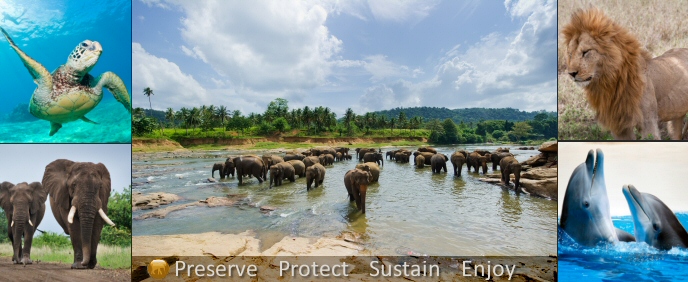
Swimming with Dolphins - Sustainable Tourism & Conservation Laws
Swimming with dolphins is an extremely popular activity at many tourist locations around the world. It provides tourists with the ability to get some one-on-one time with these very intelligent animals, and it provides a healthy source of income for local communities as well. While there are definitely economic benefits to swimming with dolphins, there are some people who believe that this practice is unhealthy for the animals and should be stopped. Without getting too involved with the emotional reasons behind why people support or deride swimming with dolphins, there are a few factual points of interest that are at the heart of this debate.
There are some definite "pros" to allowing tourists to swim with dolphins that cannot be ignored. First of all, this activity draws in a huge amount of tourism money for local communities. Given that this industry is seeing steady growth every year, it is fairly clear that tourists want to engage in this experience. The increased interest in swimming with dolphins has the potential to bring tourists to coastal areas that would otherwise have no major "draw" for tourism. Many of these operations involve swimming with dolphins that are free-roaming in the wild, which approach boats as they come into view. Since these dolphins are not kept in captivity, some believe that the negative impacts on them are marginal since the animals have the option of leaving.
On the other side of this argument, there are a few "cons" to consider. There is a growing body of research that states that even swimming with free-roaming dolphins has negative effects on their well-being. This is due largely to the fact that many of these dolphins become dependent on human sources of food, and because the large numbers of tourists that come at once can be a stressful encounter. This belief is especially held toward operations that use captive dolphins for the purpose of human interaction. Many wildlife scientists have come out against these captive operations, stating that there is no conceivable way that they can provide dolphins with the room they need to thrive, and the engagement they need to stay emotionally content. They also state that dolphins are unique in that they possess a highly sophisticated intellect, and their captivity is therefore unethical.
The laws surrounding the act of swimming with dolphins vary from place to place, and are subject to different legal interpretations even within the nations. A country with a sometimes conflicting stance on swimming with dolphins is the United States. For example, the Marine Mammal Protection Act strictly prohibits the harassment of marine mammals, but it doesn't give an absolute definition of what constitutes "harassment". This has led to differing viewpoints on the practice from state to state along the US coast. While some states allow off-shore swimming with dolphins, others only allow tourists to swim with dolphins while they reside in dedicated rehab or zoological facilities. By contrast, many Caribbean nations openly advocate the practice, but they regulate it to produce a profit. There is no country in the world today that has a complete and total ban on swimming with dolphins, however there are some that outlaw it in the wild. The nature of these laws is fluid, with changes constantly being made-- especially in countries that rely heavily on marine tourism.
In the end, the act of swimming with dolphins is something of an ethical dichotomy. On one hand, the animals themselves can sometimes suffer negative consequences from undue interactions with humans. On the other hand, those damages can conceivably be mitigated by the implementation of a science-based conservation plan. Also, the activity promotes tourism and a healthier economy in areas of the world that often have no access to the amenities found in larger cities. While the activity itself will likely always remain a point of heated debate, it will no doubt continue into the foreseeable future. By hiring reputable guides or businesses for a dolphin experience, tourists can help to ensure that they are engaging in an activity that is sanctioned by the laws of the country or region they are visiting. The only other way to be sure of the legality of this practice in a specific place is to check the state tourism website for information.

